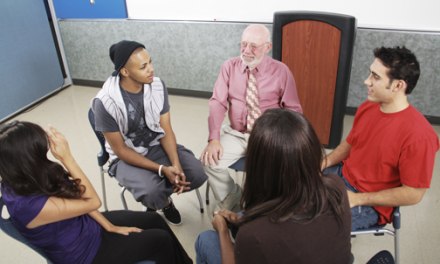I’ve noticed in online counselor forums that many therapists and counselors are quite reluctant to refer clients to 12 Step fellowships. Their suspicions might be divided into three broad categories.
- A client had a bad experience. A recent example: a counselor complained that her younger female clients were ‘hit on’ by men at meetings. “Many of my clients are trauma victims,” she added, “and the last thing they need to suffer through is uninvited advances from horny young guys.” Another described NA meetings as ‘hunting grounds for sexual predators.’ Her opinion was based on the fact that many of the attendees had criminal records.
- A client got bad advice from someone at a meeting. Professionals have long argued that 12 Step members exceed their role when they express opinions on areas they’re not trained for– like mental illness. “My patient’s sponsor advised him to drop out of therapy,” objected a psychologist. “The sponsor’s a tax accountant, for pete’s sake. What does he know about psychotherapy?” Still other professionals have complained about an anti-medication bias among 12 Steppers.
- It’s really just religion in sheep’s clothing. Religion is always a hot button topic in the U.S., along with taxes. Nobody likes having someone else’s religious beliefs thrust on them. Although the 12 Step fellowships aren’t actually religious in nature, for many, they’re entirely too close for comfort. There are solidly nonspiritual alternatives available, such as SMART and Women for Sobriety, but they’re less common and therapists are often unaware of them.
You can’t say the above complaints are without merit. These things do happen, and when they do, it’s a problem. Still, professionals often allow such sentiments to cross the line from observation to prejudice — a preconceived negative opinion that affects treatment. This isn’t easy for many professionals to acknowledge. They may take pride in maintaining objectivity (it’s actually a value in many ethical codes), and resist any suggestion that they may be biased.
“Personally, I believe AA and NA are toxic to mental health,” one therapist opined in an online discussion. “But I would never express that to a client. The client directs treatment. If he or she wants to attend these groups, I allow it.”
Of course anyone who’s ever been on the other side of therapy knows that this therapist’s feelings would be instantly apparent to the client, through tone and expression, in spite of the professional’s efforts to hide them. You might as well write ‘I don’t want you to go to AA’ in big letters on the wall behind the therapist’s chair. It’s about that obvious.
As I’ve said before, it’s unfortunate that more professionals can’t get past these barriers, because the evidence is that alcoholics and addicts who do get involved in these fellowships, particularly to the point of sponsoring another person, benefit significantly in terms of their own recovery — not just its sustainability, but its quality.














I will forward this to my UP “Finlander” Friend from the recovery community.
I’ve seen it both ways where treatment requires AA attendance and where professionals question AA. These groups, esp NA can have many with criminal records and people attending can relapse but since people trying to stay sober are usually trying to stay away from situations triggering relapse these groups are a way to spend time and socialize w/o drugs or alcohol. A lot of non addicts shun alcoholics and addicts. The religious aspect is such a minor issue as the “12 steps” are relevant to anyone to try to be a better person. There are many meetings in many locations. I believe 12 step alone is probably not enough, but 1 hour of therapy once a week is also not enough and can be quite expensive. Therapists should have groups or run their own alternatives to AA, but until an AA alternative catches on, AA/NA is really helpful for many people. There is a trend for AA/NA meetings for young people which can be helpful to stay away from the “everyone is doing drugs scene” in early sobriety. Females should take care, but that applies in any situation, even therapy.
A footnote.
There’s a long way still within the healthcare services to build those bridges in this country. There are old presumptions that need to be addressed and also deeply steeped into the mainstream health care services some serious core issues that need to change.
Stigma, marginalizing, labeling that still happens even within the professional sector.
We all know what a drunk/addict looks like here in Finland… I have FIRMLY said on my social pages such as twitter and facebook.
Lets finally rake sobriety out of the closet in this country. Share the success versus nattering on and on about “the problems” Hell … we’re doing well with this stuff openly in North America.
Even the mainstream programs in the media, series, movies address recovery and sobriety openly. Making it a point in taking away the Stigma.
And ! Doing it realistically and well.
Hell … that drunk was stigmatized long enough. It bothers me that that person who is sober has been sober and clean for even decades in this country continues to be stigmatized/marginalized, most of all by the professional sector, being more the enemy and further victimizing that man or woman. Instead of a Plus Plus Thing as we see in Canada as an example.
Its sexy to be sober and clean !
Well… I suspect a lot of countries on the government level has a long way to go.
Too often these supposed recovery clinics are nothing more than Big Business at the expense of that person and that bill ultimately to the tax payer.
My bottom line comment often enough to the city officials has been(here) lets turn those tax burdens into tax payers. The light goes on for a while…
I also see too often how many professionals simply do not have a comprehensive work tools base. Outmoded rigid therapy methods… I too often find the content lacking in substance and too often the core massage is totally not there.
So… maybe ..just maybe it requires some real honesty and coming out of denial. Bravely asking those big questions…stepping out of our comfort zones. There’s just so many phobias playing on in the back ground noise. Too often influenced by … and that list is long.
My socio-political mantra (here in Finland stands)
” We can do More, We can do Better, Why settle for Less..”
Johanness-Poul Haukkavaara
I STAND by My comments
http://www.twitter.com/JPHaukkavaara
As I am one of those professionals working in the community today, In this field.
The above comments are very relavente.
I grew up within the 12 step rooms.
Here comes the “but”
Collectively within our group we understood from the word get go (as I do today within the Tampere group)
1) outside help is important, professional services and other medical services are more often than not needed. We encourage our 12 step friends in getting it. As the 12 step rooms cannot be all for everyone.
We, I also add in that the 12 step experience is but one part of the whole process NOT THE only way into sustainable sobriety. ( I had some really healthy friends along the way who suggested some great stuff)
2, 13 stepping and as known as. Sexual predatorial advances are not condoned in our groups. Its not right! At any point especially when someone guy or gal is in such a vulnerable place. Its just down right NOT allowed. I have seen this enough times even here in Finland. Total disregard for that gal…so NOT on my watch.
3) a forever reminder as in the AA literature clearly states. These are but SUGGESTED STEPS in recover. Anyone who starts to order with, you must do this you must do that.. its nolonger an AA meeting its just a bunch of cultists who’ve hijacked the AA NAME.
3, as to the spiritual aspect. Its how an individual experiences it personally. Its their business… not any AA members right to dictate in any way. We have friends in our group who do not have any specific spiritual belief system… its totally and never infringed upon.
We, despise any forms of spiritual and or emotional black mailing and hostage taking. Not even on an attempted passive level. It goes against everything about Love and feeling safe. To be in a more functional circle of friends who want to grow, broaden, re-discover themselves.
The idea also is that this is as said but one of the stepping stones back into real successful living. You decide personally what works for you the best.
No one is supposed to hide away from the rest of the world the rest of the time. Those AA meetings are not meant to be crutches.
Personally, as I am openly gay I am also openly sober and clean. (Especially here in Finland) as I refuse to shame base about my being a gay man… why on heavens earth would I hide being sober and clean… my journey began in March of 1988 … I took it more seriously in June 1988… its been a messy at times road.
My therapist described my journey as .. being deprogrammed from a cultist movement. As I had inherited bought into wrongly learnt life lessons.
My therapist (at a 150.00 dollars an our, actually 50min) before I cleaned up my act.. at the age of 27. He looked at me. Pointedly said… we cant go on like this till you remove one obstacle. I LOOKED AT HIM STUNNED. Take out the substance abuse out of this picture and when you’ve been sober and clean for 6months..call me.
To this day I am forever grateful for his honesty… I ultimately did.
We in our LGBT friendly 12 step rooms in Toronto did understand the need for professional help. A lot of great referrals where made.
I did return to my therapist and it was a lot of work for me for many years to find a balance.
But !
I also had from those guys and gals incredible support when I faced life threatening cancer. They could help enough. Jumping over each other.
We also spent time with each other as real friends going out dancing, being playful and yes cruising in healthier circles and attitudes. (Great group discussions such AS Sex and Sobriety and what it means to us in sobriety)
We also, I also realized how human and flawed we are as humans. And also forgiving. Terms like “only requirement for AA membership is a desire to stop drinking” some of us didnt get it the first time.
We, I also never turned coat tail on my friends if they happened to be “exploring” I just pointedly walked over and hugged my friend… your Loved !! PERIOD !!! Leaving that door wide open… when they wanted to come home. This is why personally despise comments/value-judgements “their out there” and that list goes on. Setting a passive fear on those who are within the AA rooms. Its a phobia I refuse NOT to address. Its addressed very directly when it rears its ugly head.
I know that as a fact so many of my friends chose to sober up again because someone did NOT turn-coat on them.
Today, our group meets tuesdays and fridays. Open meetings the first tuesday snd friday of every month.
As we are an LGBT friendly group. Those who “get it” pop in. The sweetest thing is there’s such a balance to it.
This group is the first of its kind in Finland that is also openly LGBT friendly within the mainstrean 12 step circles. It clearly states who we are.
With it a massive support network surrounding it, internationally.
We do not advertize per say… dont have to … it got around real fast for various reasons…
Finally our mandate: our sole purpose here is to support that individuals recover from their addictions. Yeah we have a lot of cross-addicted friends too. Its so OK to be here within our circles.
Surprisingly our 7/24hr hotline gets calls mostly from the hetero community. Which also is so ok.
So thats our story… thats a bit of my story thrown in too.
Lots of love !
Johanness-Poul
a happy older sober and clean older gay man, A Canadian living abroad in this case Finland.